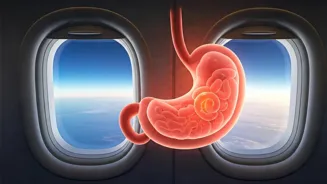Altitude and Air
One of the main culprits behind jet belly is the change in air pressure experienced during flights. As the aircraft climbs to high altitudes, the air pressure inside
the cabin drops. This causes gases within your body, particularly in the intestines, to expand. Think of it like a balloon: as you take it higher, the air inside stretches it out. This expansion can lead to bloating, discomfort, and even stomach pain. Furthermore, the air inside the plane itself can also contribute. Air conditioning systems recirculate and dry out the air, which can lead to dehydration, another factor that can make bloating worse. This is especially true if one is not consuming enough water. Therefore, keeping well-hydrated is essential to mitigate these effects.
Dietary Choices Impact
What you eat and drink before and during a flight significantly influences your likelihood of experiencing jet belly. Certain foods and beverages are known to exacerbate bloating. Carbonated drinks, like soda and sparkling water, introduce extra gas into your digestive system, amplifying the effects of altitude. Similarly, high-sodium foods, such as processed snacks and salty meals, can cause your body to retain water, leading to swelling and bloating. Eating large meals right before flying can also overload your digestive system, making it more susceptible to discomfort. Opting for easily digestible foods, like fruits, vegetables, and lean proteins, is a far better choice for a comfortable journey. Avoiding foods known to cause gas, such as beans and broccoli, is another practical way to minimise bloating.
Hydration: Key Factor
Maintaining proper hydration is crucial for preventing and alleviating jet belly. The dry air in the airplane cabin can lead to dehydration, which in turn, exacerbates bloating and constipation. Drinking plenty of water before, during, and after your flight helps your body function optimally and promotes regular bowel movements. Aim to drink at least 8 ounces of water for every few hours of flight time. Beyond water, herbal teas and fruit-infused water are also good choices, providing hydration and additional benefits like aiding digestion. Avoiding excessive alcohol and caffeine can also make a significant difference, as these beverages can have diuretic effects, leading to dehydration and increased bloating. Simple hydration strategies can make your flight a much more comfortable experience.
Movement is Important
Physical inactivity during a flight can contribute to the development of jet belly. Sitting for extended periods can slow down your digestion and trap gas in your intestines. Simple movements, such as walking up and down the aisle, can help stimulate your digestive system. Try to get up and move around every hour or two during the flight. If that is not possible, incorporate gentle exercises in your seat. Simple stretches and exercises, such as rotating your ankles, flexing your feet, and twisting your torso, can improve circulation and stimulate digestion. These exercises help to prevent gas buildup. Staying active, both physically and mentally, can improve your in-flight experience.
Proactive Remedies
There are several proactive steps you can take to minimize jet belly. Over-the-counter remedies like simethicone, which helps to break down gas bubbles, can be helpful. Activated charcoal can also help absorb gas and reduce bloating. Drinking ginger tea or chewing on ginger can also ease digestive issues and discomfort. Wearing compression socks can also promote circulation, reducing swelling in your legs and abdomen. Before flying, avoid overeating and choose easily digestible foods. For some, certain foods might cause more bloating than others. Knowing how your body responds to the food you consume will help you to make better decisions. By combining these strategies, you can significantly improve your in-flight comfort and minimize the impact of jet belly.













